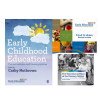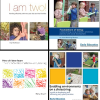Chapter 1: The centrality of play in early childhood
Back to overview of chapter resources Chapter authors Nancy Stewart Kierna Corr Julia Henderson Chapter overview Play is a fundamental in childhood, and enshrined as
This chapter is a little different from the others. It considers the key issues which have dominated the last 100 years, so that we might anticipate a future of rich possibilities for young children, those who work with them, and their families – in early years settings across the UK. The Centenary Year of Early Education in 2023, saw extreme and multiple challenges for ECE and the wider world. This book has been written at a time of intense global challenge: the COVID-19 pandemic; escalating concerns around global environmental damage; war and conflict in several parts of the world – including Europe; increasing numbers of young children who are homeless, refugees and asylum seekers; many forms of exclusion and discrimination, and rising poverty – with increasing numbers of families relying on food banks. The contributors of this book have offered positive messages of what is needed to ensure high quality experiences and services for young children around the UK. Building on their conclusions we offer an agenda for the future of early childhood education.
Our agenda is underpinned the chapters in the book. For further reading and resource materials please visit other chapter webpages here.
This book demonstrates that early childhood education settings and services around the UK have some high-quality practices which can be shared across the whole country. We have also seen how enabling policies truly enhance learning, and where policy is found to cut across meaningful pedagogy and children’s rights and interests, there are examples from our neighbouring countries in the UK which can assist and be built on.
Since the organisation was established in 1923, members of Early Education have played a strong role in lobbying for policy change. Our first President Margaret McMillan, lobbied for free school meals for young children; Nursery education; health checks and well qualified staff to work with young children. In our Centenary year of 2023, many children are still hungry, and many settings continue to work to mitigate the very present daily effects of poverty. Some early years settings, including maintained nursery schools, have closed, while others struggle for adequate funding. Early years practitioners are undervalued and underpaid, leading to a recruitment and retention crisis that is both caused by and compounds the funding crisis. The eight points of our agenda for the future of early childhood education is an agenda for action. Realising these changes will take political will, driven by public pressure. We invite all like-minded individuals to join us in our continuing campaigning by becoming members of Early Education, strengthening our voice and adding to the pressure for change.

Back to overview of chapter resources Chapter authors Nancy Stewart Kierna Corr Julia Henderson Chapter overview Play is a fundamental in childhood, and enshrined as
Back to overview of chapter resources Chapter authors Verity Campbell- Barr Sasha Tregenza May Chapter overview In this chapter, we explore and analyse developments in
Back to overview of chapter resources Chapter authors Sue Allingham Nicola Brinning Chapter overview This chapter is built around the policy contexts of Wales and
Back to overview of chapter resources Chapter authors Alison Featherbe Louise Lloyd-Evans Helen Moylett Chapter overview In the early years, where our habits of mind
Back to overview of chapter resources Chapter authors Elizabeth Henderson Emma Gordon Helen McKinnon Jacqueline Bremner Maggie MacDonald Chapter overview Taking a Scottish perspective, this
Back to overview of chapter resources Chapter authors Cathy Nutbrown Becky Cook Chapter overview Early childhood education settings are increasingly, developing work with parents to
Back to overview of chapter resources Chapter authors Aline-Wendy Dunlop Lisa Barnes Myra McRobbie Chapter overview In this chapter we have chosen a transitions lens
Back to overview of chapter resources Chapter authors Jan Georgeson Emma Short Helen Adams Kate Ullman Chapter overview This chapter traces a brief history of
Back to overview of chapter resources Chapter authors Stella Louis Sally Cave Nasma Meah Chapter overview This chapter outlines what anti-discriminatory practice is and the
Back to overview of chapter resources Chapter authors Shaddai Tembo Fifi Benham Chapter overview This chapter examines the role of gender and LGBTQ+ inclusive practice
Back to overview of chapter resources Chapter authors Kathy Sylva Lesley Curtis Chapter overview This chapter explores the role of Children’s Centres (CCs) in serving
Back to overview of chapter resources Chapter authors Nathan Archer David Yates Chapter overview When considering the future, looking back at recent changes in the
Back to overview of chapter resources Chapter authors Elizabeth Wood Louise Kay Jessica Travers Chapter overview This chapter draws on international research to indicate how






Early Education
2 Victoria Square
St Albans
AL1 3TF
T: 01727 884925
E: office@early-education.org.uk